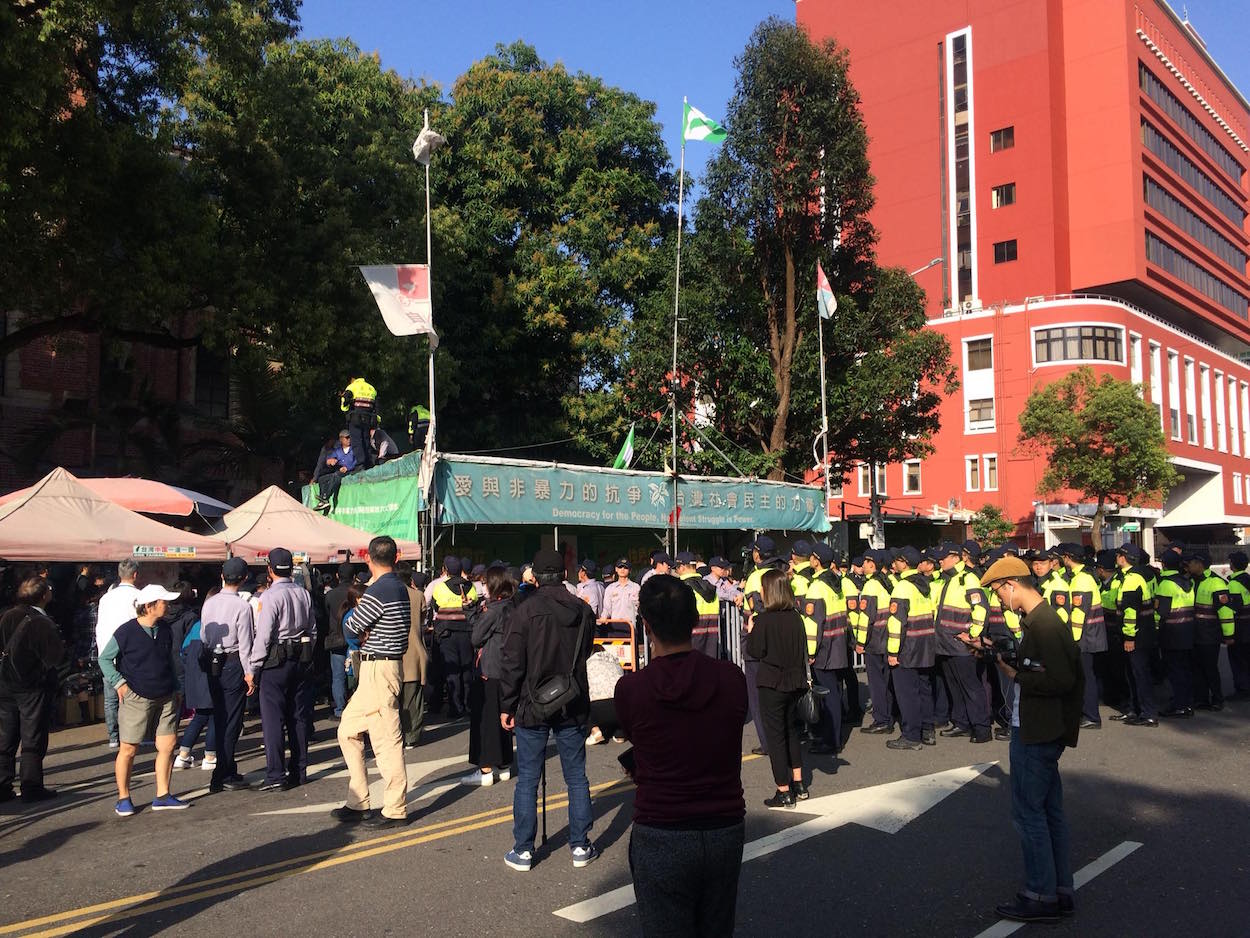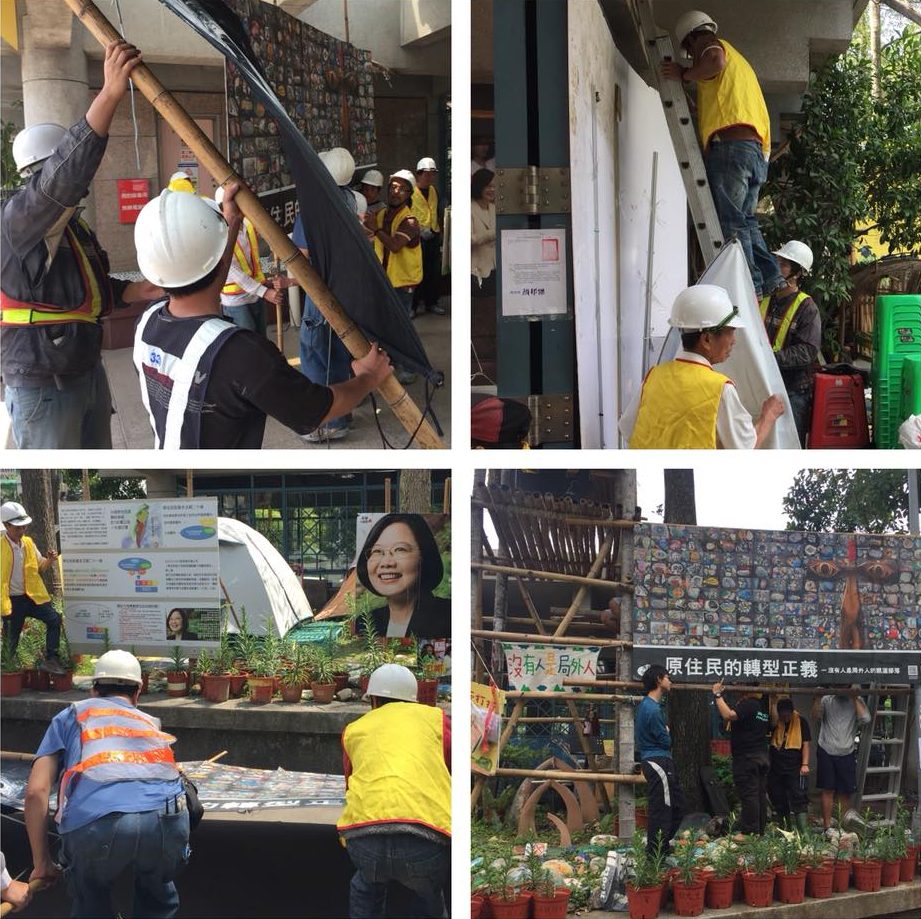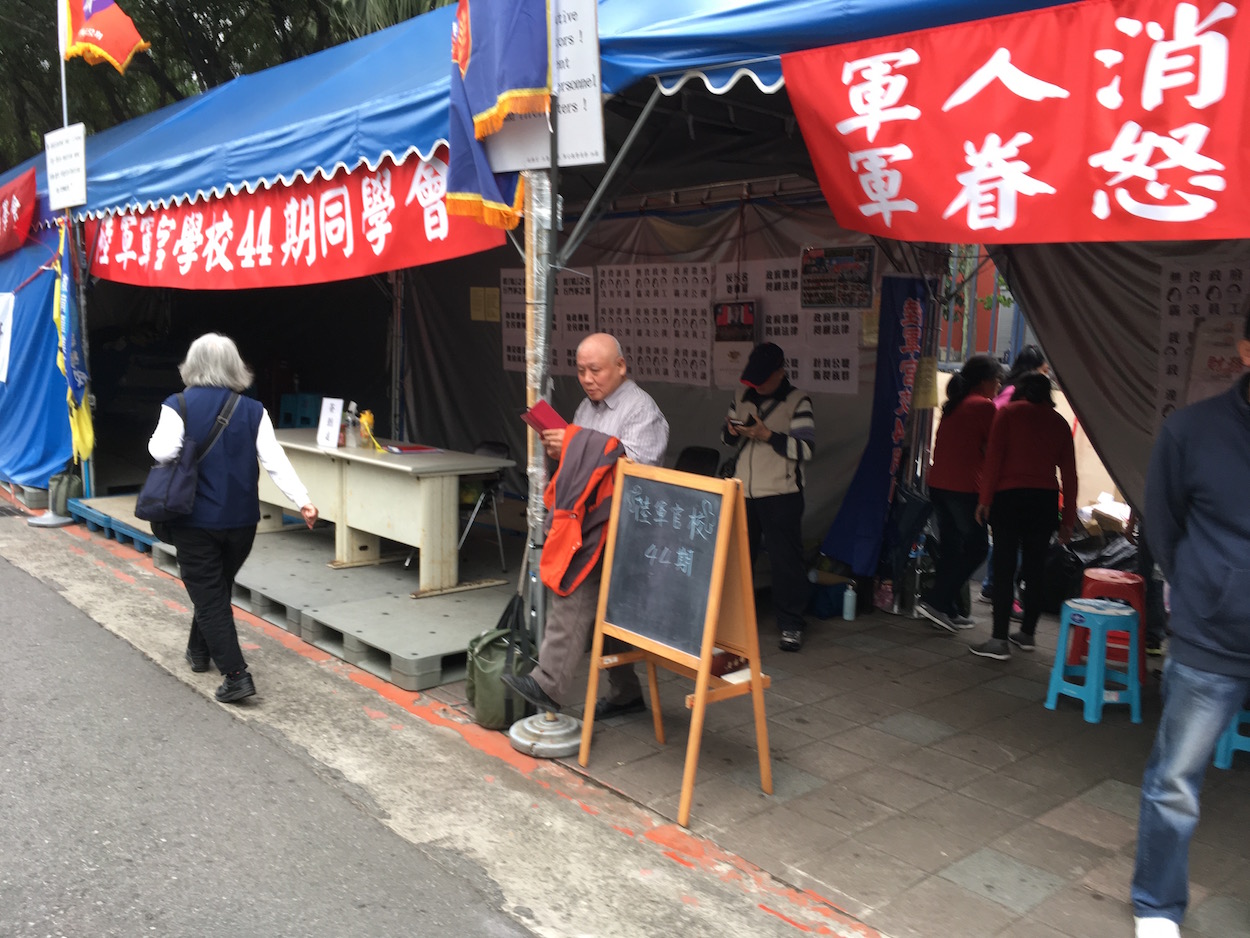by Brian Hioe
語言:
English
Photo Credit: Ko Wen-Je/Facebook
TAIPEI MAYOR Ko Wen-je continues to come under fire for the eviction of protest occupations around the Legislative Yuan. However, Ko is accused of selective policing practices in evicting occupation encampments with closer ties to pro-Taiwan civil society while allowing pan-Blue occupations to remain.
The dismantlement of the Alliance of Referendum for Taiwan/Free Taiwan Party’s (ART/FTP) occupation outside of the Legislative Yuan calling for a referendum on Taiwanese independence would prove particularly shocking, seeing as the occupation encampment has been allowed to stand outside the Legislative Yuan for over ten years. Likewise, the ART/FTP has recently suffered a number of violent attacks from members of the pan-Blue camp, including an attack on the encampment by the “800 Heroes,” a nearby anti-pension reform occupation, and a physical attack on ART/FTP convenor Tsay Ting-Kuei at a press conference.
 Police taking apart the Alliance of Referendum for Taiwan/Free Taiwan Party’s occupation encampment outside the Legislative Yuan. Photo credit: Free Taiwan Party/Facebook
Police taking apart the Alliance of Referendum for Taiwan/Free Taiwan Party’s occupation encampment outside the Legislative Yuan. Photo credit: Free Taiwan Party/Facebook
Tsay has accused Ko’s actions of being politically motivated, seeing as Tsay recently declared that he intended to compete with Ko in 2018 Taipei mayoral elections. This would be an adjustment of positions by Tsay, seeing as while the ART/FTP has fielded candidates in the past, Tsay himself usually refrained from running for office.
Attempts to evict indigenous demonstrators demonstrating for the return of indigenous traditional territories has proven much the same. Indigenous demonstrators have been demonstrating for over 400 days, their occupation being on Ketagalan Boulevard in front of the Presidential Office Building, then relocating to outside Exit 1 NTU Hospital Station after being evicted by police. Among indigenous demonstrators are singer-songwriters Panay and Nabu, the latter of which performed at Tsai Ing-Wen’s inauguration, and documentary filmmaker Mayaw Biho.
The past week has seen a wave of evictions of indigenous communities, including the demolition of the Ljavek community in Kaohsiung, one of Taiwan’s few remaining indigenous communities in urban areas, and the eviction of indigenous vendors outside a former residence of Zhang Xueliang in Chingchuan, near Hsinchu. But while police attempted to evict indigenous demonstrators and eventually fined, indigenous demonstrators still remain outside of Exit 1 of the NTU Hospital MRT station.
However, what has raised ire is that while the former two occupations were evicted, the occupation encampment of the “800 Soldiers” has been allowed to remain. The “800 Soldiers”’ occupation encampment has also existed for over a year, but unlike the other two encampments, it is not supported by pro-Taiwan civil society.
 Rebuilding at the indigenous occupation outside of NTU Hospital MRT station, following police dismantling part of the encampment. Photo credit: Mayaw Biho/Facebook
Rebuilding at the indigenous occupation outside of NTU Hospital MRT station, following police dismantling part of the encampment. Photo credit: Mayaw Biho/Facebook
The “800 Heroes” are primarily military veterans demonstrating against the Tsai administration’s planned pension reforms. The “800 Heroes” are demonstrating against the planned pension reforms of the Tsai administration, seeing as the pension system will soon go bankrupt if reforms are not made. Regardless, the “800 Heroes” are upset at the loss of their pensions, given that the KMT paid generous pensions to military personnel, members of the police, public servants, and teachers as a reward for political loyalty during the authoritarian period.
While the Tsai administration has asserted that it does not wish to impoverish veterans—indeed, under new regulations, veterans will still receive more than the average monthly salary in Taiwan through their pensions—this has not prevented anger from veterans. Due to pro-unification views, the “800 Soldiers” have probably are likely angry at the DPP for more than simply pension reforms, which has led to attacks on Taiwanese independence groups, and attempts to storm the Legislative Yuan.
However, it is as such that the “800 Heroes”’ occupation encampment proves decidedly different than the two recently evicted encampments. Their demands have failed to resonate with pro-Taiwan civil society, particularly in consideration of that such veterans were former enforcers of the KMT party-state during the authoritarian period, and because their demands for luxurious pensions impoverish the rest of Taiwanese society.
While the Taipei city government has also suggested that it may evict this encampment, the fact that their encampment has been the only encampment which has not faced eviction threats so far leads to accusation that the Taipei city government may be treating them differently. Taipei mayor Ko Wen-Je may seek to appeal to Taipei voters in 2018 elections by leveraging on the issue, seeing as Taipei voters are usually more conservative and more pan-Blue leaning.
 The “800 Heroes”‘ occupation encampment. Photo credit: Brian Hioe
The “800 Heroes”‘ occupation encampment. Photo credit: Brian Hioe
However, this will add to accusations that Ko has proven a political turncoat. Ko road into power in 2014 Taipei mayoral elections with the support of pro-Taiwan civil society and post-Sunflower Movement youth activists, but Ko has since conducted controversial city-level exchanges between Taipei and Shanghai, is accused of allowing pro-unification gangsters willing to use violence against students off the hook, and made public appearances with no less than former killer of political dissidents “White Wolf” Chang An-Lo. Anger against Ko from Taiwanese civil society will continue to grow, then.

